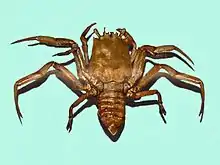Ethusa mascarone
Ethusa mascarone is a species of crabs in the family Ethusidae.[1][2]
| Ethusa mascarone | |
|---|---|
 | |
| Ethusa mascarone. Museum specimen | |
| Scientific classification | |
| Domain: | Eukaryota |
| Kingdom: | Animalia |
| Phylum: | Arthropoda |
| Class: | Malacostraca |
| Order: | Decapoda |
| Suborder: | Pleocyemata |
| Infraorder: | Brachyura |
| Family: | Ethusidae |
| Genus: | Ethusa |
| Species: | E. mascarone |
| Binomial name | |
| Ethusa mascarone (Herbst, 1785) | |
| Synonyms | |
| |
Description
The cephalothorax of Ethusa mascarone is almost rectangular, it can reach a length of 15 millimetres (0.59 in) and a width of 13 millimetres (0.51 in). The body color is gray-brown, with brown lines on the carapace and transverse striae on the abdomen. Chelipeds and legs are lighter and white speckled.[3]
The front pairs of legs are long, but the hind legs are shorter and are used to carry on the back a variety of objects and organisms, especially valves of bivalves, by which these crabs camouflage and protect themselves.[4] It has been described as a decorator crab despite not belonging to the superfamily Majoidea.[5]
They mainly feed on small organisms and decaying flesh of dead animals.[4]
Habitat
These crabs live on sandy substrate and muddy bottom, from a few meters up to 75 m deep.[4]
Behavior
Under hypoxic conditions, Ethusa mascarone has been observed to discard its objects of camouflage "to either increase mobility and/or reduce oxygen demand".[5]
References
- Encyclopedia of life
- ITIS
- Tegnue.chioggia
- Podvodni
- Riedel, Bettina; Diaz, Robert; Rosenberg, Rutger; Stachowitsch, Michael (March 2016). "Chapter 10: The ecological consequences of marine hypoxia: from behavioural to ecosystem responses". In Solan, Martin; Whiteley, Nia (eds.). Stressors in the Marine Environment: Physiological and ecological responses; societal implications. Oxford University Press. p. 182. ISBN 9780198718826. Retrieved December 27, 2021.
- WoRMS
- Sealife Base
- Türkay, M. (2001). Decapoda, in: Costello, M.J. et al. (Ed.) (2001). European register of marine species: a check-list of the marine species in Europe and a bibliography of guides to their identification. Collection Patrimoines Naturels, 50: pp. 284–292